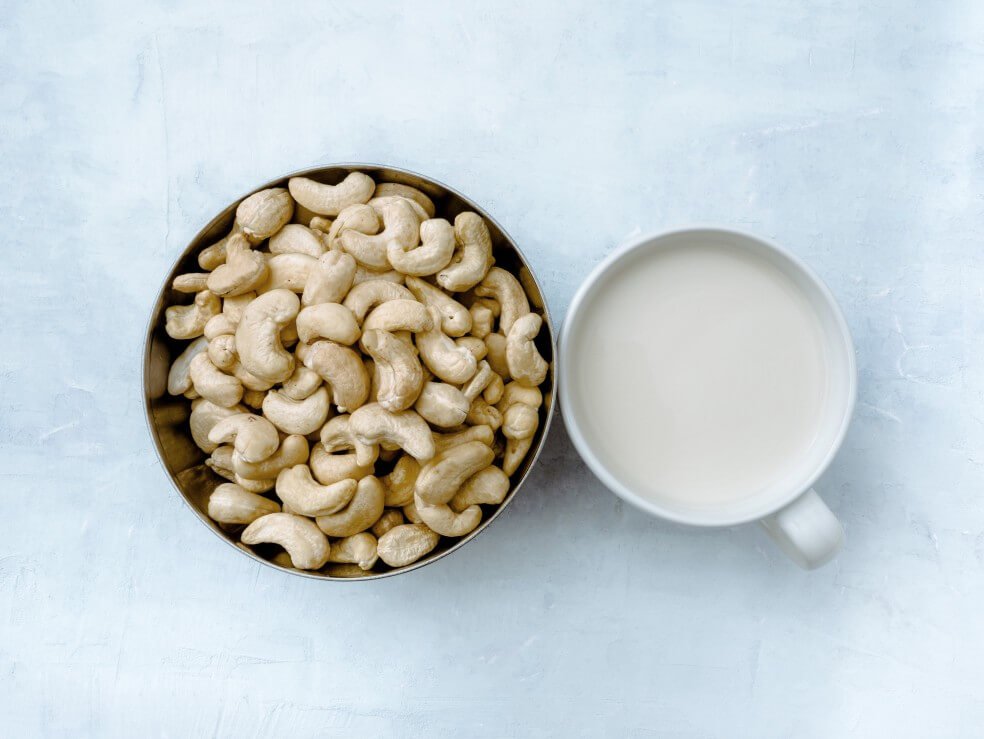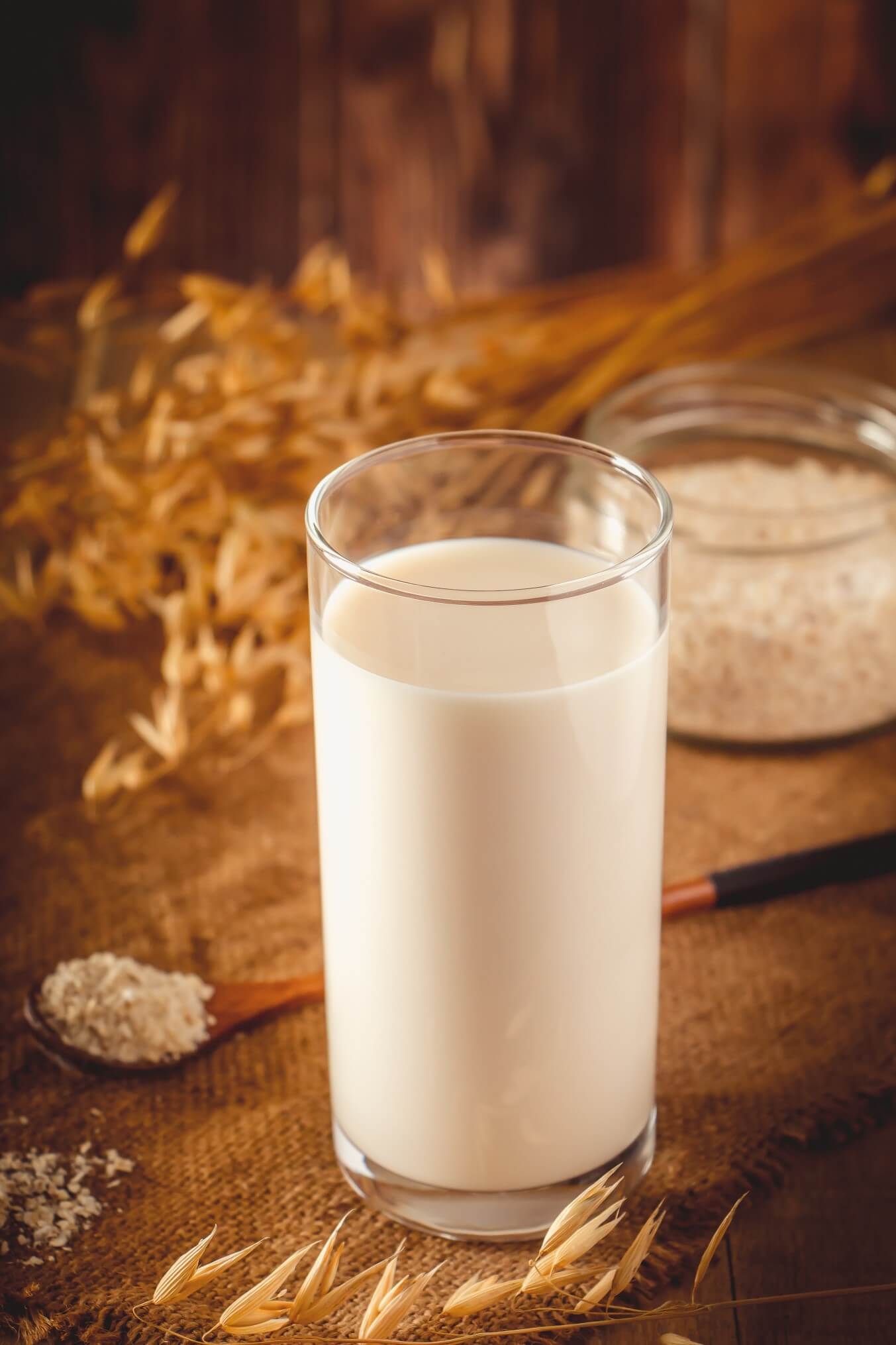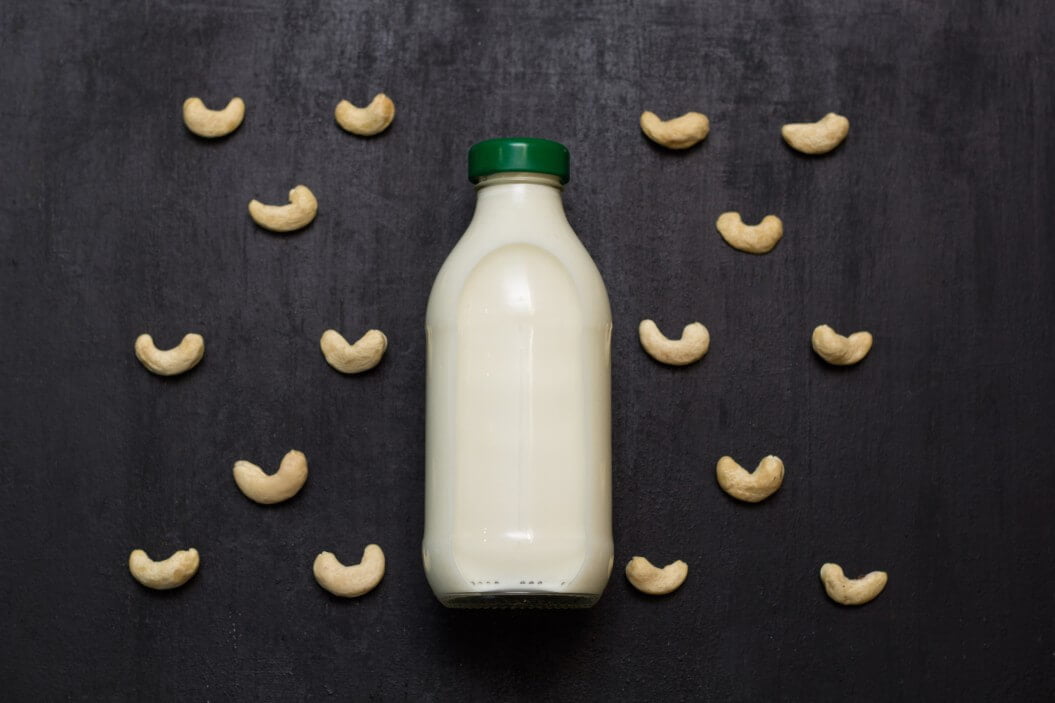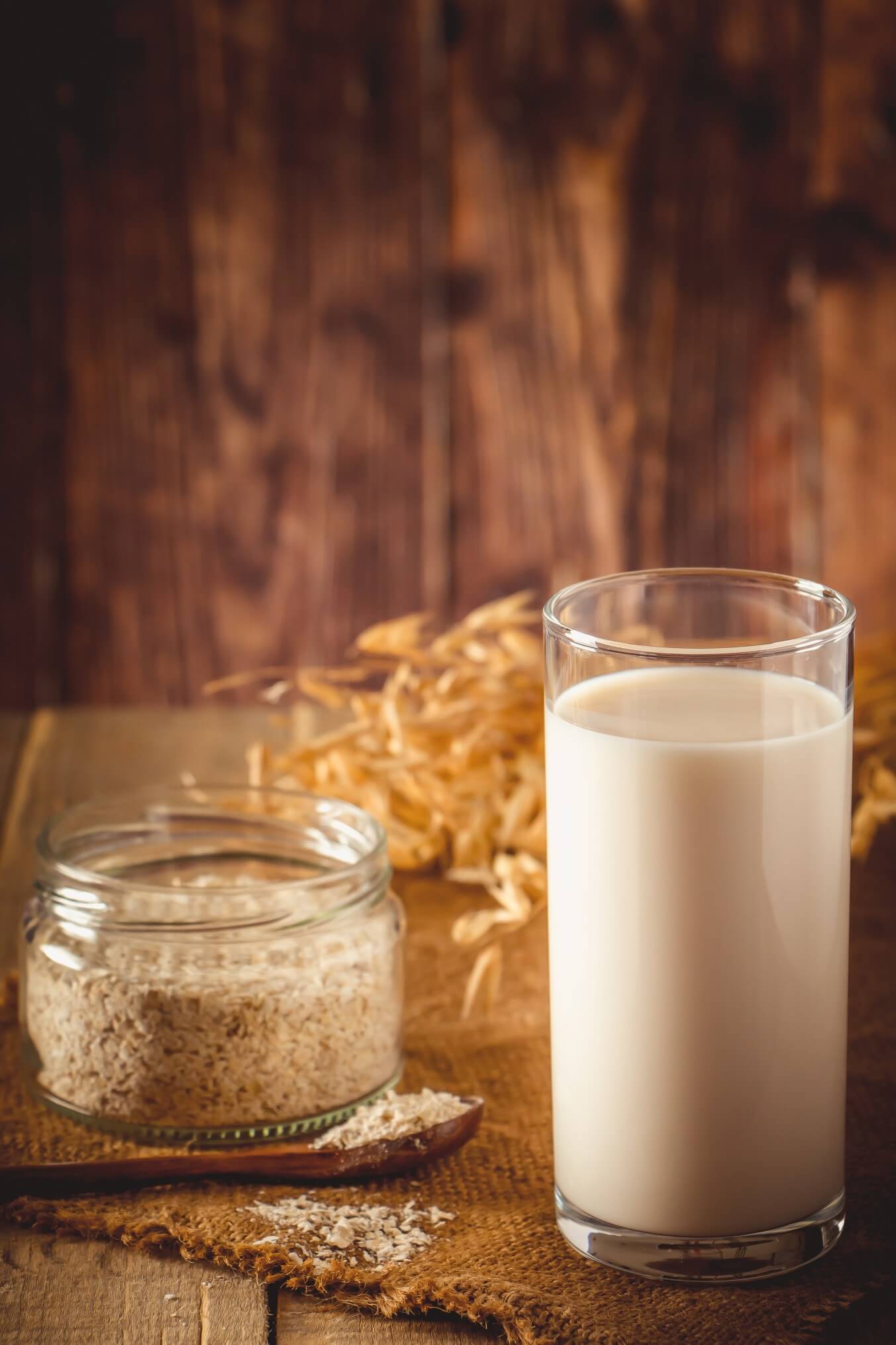Oat milk and cashew milk are both growing more in popularity in the plant-based milk world, as they’re ideal for adding to coffee, cereal, recipes, and more.
But when we look at the two and compare their features, how are they different in terms of nutrition, flavor, and other important qualities?
Oat milk and cashew milk are both nutrient-rich and lactose-free, but they differ in terms of other allergens, diet-friendliness, and the kinds of nutrients they each contain. Additionally, oat milk is often sweeter than cashew milk, and they have different environmental implications.
Keep reading to learn more about the specific vitamins, minerals, and other nutrients found in oat milk and cashew milk.
We’ll also explore the textures, tastes, allergens, and other important factors of each type of milk.
Nutrition - Oat Milk vs Cashew Milk
Although both oat milk and cashew milk pack in protein and calcium, they differ in terms of their relative dietary fiber, fat, sugar, carbs, calories, and other nutrient content.
Below, we’ll explore the differences in nutrition when it comes to the following factors:
1 Cup | Oat Milk | Cashew Milk |
|---|---|---|
Calories | 120 | 24 |
Protein | 3g | 1g |
Fat | 5g | 2g |
Carbohydrates | 16g | 2g |
Fiber | 2g | 0g |
Calories
One of the most important nutrient factors that consumers look for on a food/drink label is caloric content.
Those on low-calorie diets will probably opt for cashew milk over oat milk due to the difference in calories.
Oat milk has about 120 calories per cup, while cashew milk has about 24 calories per cup.
However, calories aren’t the only thing to look for on a label, and it’s good to keep in mind that calories are important in providing us with energy.
Protein
Knowing that cashew is a tree nut may have you under the impression that it is richer in protein than oat milk.
However, a single cup of oat milk has 2 g more of protein (3 g) than a cup of cashew milk does (1 g).
Keeping that in mind, it’s also worth noting that cow’s milk has more protein per one-cup serving than both cashew milk and oat milk do.
And since many vegans and vegetarians turn to drinks like cashew milk for a protein boost, these types of milk may not be the most optimal places to find it.
Fat
You can’t avoid consuming some fat when you drink cashew milk or oat milk.
However, you can cut back on fat content by opting for cashew milk instead of oat milk.
A cup of oat milk has 5 g of fat, whereas a cup of cashew milk has only 2 g of fat.
Of those fats found in oat milk, you typically won’t find the ultra-healthy fats known as unsaturated fatty acids (unsaturated fat).
However, when it comes to cashew milk, the 2 g of fat per cup consists of unsaturated fatty acids, which are linked to lower LDL-cholesterol plasma levels and lowered risk of coronary heart disease.

Carbs
Oat milk, being a product derived from grains, is a naturally carb-rich beverage.
Compared to cashew milk, oat milk has far more carbohydrates, including sugar and dietary fiber that cashew milk doesn’t contain.
This is why oat milk is among the sweeter plant-based kinds of milk. Unfortunately, this high carb content means that oat milk isn’t usually keto-friendly.
Oat milk has roughly 16 g of carbs per one-cup serving, while cashew milk only has about 2 g of carbs per cup.
One of the reasons that people drink oat milk instead of other plant-based milks is that it’s a decent source of dietary fiber (beta-glucan), which supports gut health.
Here's a video from Livestrong.com that explains how beta-glucan works:
Calcium
Both cashew milk and oat milk contain some calcium, which makes them ideal plant-based alternatives to cow’s milk for people looking for a calcium boost.
Cashew milk contains about 451 mg of calcium per one-cup serving.
Oat milk contains about 350 mg of calcium per one-cup serving. This makes cashew milk the slightly better choice compared to oat milk when it comes to calcium content.
Furthermore, some brands of plant-based milk will supplement their drinks with extra vitamin and mineral content.
So, depending on the cashew milk or oat milk product you buy, it may contain more or less calcium than these numbers reflect.
Other Vitamins and Minerals
Aside from calcium, there are other minerals and vitamins present in cashew and oat milk products.
Oat milk contains a decent amount of Vitamin B12 (1.2 µg per one-cup serving), and it also contains some potassium (389 mg per cup).
You may even find Vitamin D or Vitamin A in oat milk products, depending on the company and whether or not they add those.
Cashew milk contains some iron (less than 1 mg per cup) and sodium (161 mg per cup) in addition to its calcium content. Cashew milk also contains some Vitamin K.

Taste
Aside from nutrition, the taste is also important in a plant-based milk since you aren’t getting the same dairy taste.
Oat milk and cashew milk are pretty different when it comes to this realm since their sugar content varies so much and they come from different kinds of plants.
Oat Milk
Oat milk is known for its naturally sweet taste that is nutty yet mild.
Unlike cashew milk, it isn’t as nutty or fatty.
Oat milk is frequently used as a creamer/milk add-in for coffee, lattes, and other beverages because of its sweetness.
Related: What Does Oat Milk Taste Like?
Cashew Milk
Cashew milk, compared to oat milk, is far more nutty, which makes sense as it comes from a tree nut.
It’s also somewhat sweet, though, and many consumers like it for its mild sweetness in coffees and teas.
Another notable flavor is a buttery taste due to the fat content in cashews.
Texture
Oat milk and cashew milk don’t vary too much when it comes to the texture and consistency.
They’re both pretty creamy and rich, which makes their textures comparable to that of cow’s milk.
Oat Milk
Oat milk is notably smooth and creamy, somewhere between the consistency of 2% cow’s milk and whole milk.
It sometimes becomes grainy or pulpy if you don’t shake it up since the oat particles can separate and settle to the bottom of the carton at times.
Cashew Milk
Cashew milk is also creamy and smooth. It’s fairly thick when compared to other plant-based milks, and it isn’t as prone to pulp or graininess.

Allergen Information
Plant-based milks are attractive because they provide a vegan milk option, as well as a lactose-free option.
However, depending on the type of plant-based milk, you won’t be able to avoid certain food allergens or restrictions when it comes to certain diets.
Oat Milk Allergens
Oat milk is host to a couple of potential food allergens.
Although it’s free of lactose, soy, egg, tree nuts, peanuts, and gluten, it does obviously contain oats.
Additionally, oat milk is more likely to get cross-contaminated with gluten as it’s being made in production facilities.
Cashew Milk Allergens
Cashew milk is not suited for people with tree nut allergies, as this could trigger anaphylaxis.
However, they are free of peanuts, lactose, egg, soy, oats, and gluten.
Diet-Friendliness
Oat milk and cashew milk also differ in terms of how well they fit into certain diets, due to the fact that they’re different nutritionally.
Oat Milk vs Cashew Milk Diet-Friendliness
As you’ll see in the table below, cashew milk is the better of the two plant-based milk options in terms of diet-friendliness.
Diet | Oat Milk | Cashew Milk |
|---|---|---|
Keto | No | No |
Paleo | No | Yes |
Whole30 | No | Yes |
Oat Milk Pros & Cons
So, why would someone want to drink oat milk when compared to cashew milk?
There are certain health benefits involved, but at the same time, there are some downsides to drinking oat milk.
Pros
Among the main health benefits of drinking oat milk are the lack of lactose, the vegan-friendliness, and the vegetarian-friendliness.
It’s also rich in Vitamin B12, which supports cell health, nervous system health, and other bodily functions.
Oat milk is a good source of it, which may even benefit those with B12 deficiencies.
Oat milk is also a decent source of healthy dietary fiber, and its calcium content is comparable to that of cow’s milk.
Oat milk production also leaves a lighter carbon footprint than cow’s milk production does.
Cons
The main downside of drinking oat milk compared to drinking cashew milk is that it’s a lot higher in calories. It is also full of sugar that cashew milk doesn’t have.
Other downsides to drinking oat milk include:
A relatively high carb content
Not suited for the keto diet
Not suited for the paleo diet
Contains some allergens and possible cross-contamination
More expensive than cow’s milk

Cashew Milk Pros & Cons
On the other hand, why would cashew milk be a good choice as a plant-based milk?
Although it’s obviously not good for people with tree nut allergies, cashew milk is very healthy and nutrient-dense in other ways.
Pros
Cashew milk benefits those on low-calorie diets and those on low-carb diets when compared to oat milk.
It’s suited to the paleo diet, vegan diet, vegetarian diet, and lactose-intolerant diet.
Further, the only allergen it contains is tree nuts, and it’s rich in calcium content. It may also support immune health, eye health, and heart health.
Cons
Some potential downsides to drinking cashew milk include:
Steep prices compared to cow’s milk
Not as widely available in stores and restaurants
Contains tree nut allergen
Not keto-friendly
It’s also worth noting that cashew milk farming and production take a toll on the environment in terms of water usage.
Although it leaves a lighter carbon footprint than cow’s milk production, cashew milk production isn’t the most sustainable practice in the plant-based milk world.
FAQs About Oat and Cashew Milk
Can cashew milk replace milk in cooking?
Yes, in some recipes, cashew milk is a suitable replacement for cow’s milk.
Note, however, that cashew milk isn’t naturally sweet and has a nuttier flavor, so you may need to supplement sweetness in your recipe or stick to recipes like smoothies and desserts that are complemented by nut flavors.
What happens to cashew milk when you heat it?
You can safely heat your cashew milk when cooking with it or add it to hot drinks.
Keep in mind, though, that cashew milk will thicken as it warms up, which may affect the texture or thickness of whatever you’re drinking or eating.
Is oat milk bad for the environment?
As a plant-based milk, oat milk has less of an effect on greenhouse gas emissions than cow’s milk production does.
However, pesticides are sometimes used in unsustainable oat farming practices, and unsustainable water usage exists in some production processes, as well.
Related: Is Oat Milk Bad For The Environment?
Is cashew milk bad for the environment?
Yes, compared to the production of other plant-based milk products, cashew milk uses more water because nuts require a lot more water to grow to maturity than soy or seeds.
However, like most plant-based milks, cashew milk reduces greenhouse emissions in production since it doesn’t involve cow flatulence resulting in a greater carbon footprint.
Conclusion
When we compare oat milk vs cashew milk, it’s obvious that there are benefits and downsides to drinking both.
Each type of plant-based milk is low in food allergens and rich in nutrients, such as vitamins, fiber, protein, and minerals.
Their flavors differ in terms of relative sweetness and nuttiness, but they’re both fairly rich and creamy milk alternatives.
At the end of the day, cashew milk has fewer calories than oat milk does, but depending on your food allergies and diet, they’re both solid choices instead of cow’s milk.
If you would like to learn more about plant-based milks and dairy alternatives, check out our numerous other articles on the topic!
